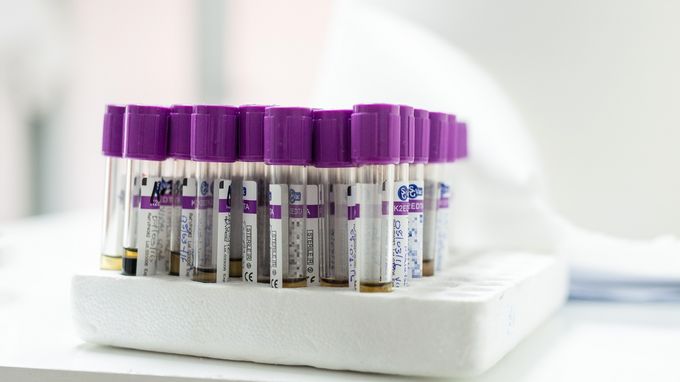Globally, around 2.6 million children and adolescents are living with HIV, with the majority of them residing in sub-Saharan Africa. These young people are more likely to experience treatment failure compared to adults. While experts have long assumed that testing for viral drug resistance could improve treatment in cases of failure, a research team led by the University of Basel, in collaboration with Swiss TPH and other partners, now shows that supporting patients in taking their medication regularly is far more important. The results were published today in the journal The Lancet Global Health.

Blood samples from patients for viral load and HIV resistance testing. (Photo: Christian Heuss, SolidarMed)
The fight against HIV has made substantial progress over the past few decades. Antiretroviral drugs keep the virus at bay, preventing it from reproducing in the body and from being transmissible to others. However, some variants of the virus have developed resistance to these medications. In high-income countries, doctors therefore test for resistance mutations when a particular antiretroviral therapy fails.
In resource-limited regions, such tests for viral mutations are not so readily available. If the treatment does not work as hoped, it becomes a guessing game for the attending physicians: they must either switch medications to avoid potential resistance to the virus, or continue with the current course of care if the reason for the treatment failure was due to medication not being taken as intended.
Given the limited funding for HIV programs in many sub-Saharan African countries, experts are debating whether providing more resistance tests, especially for children and adolescents, could improve treatment outcomes.
A team of researchers led by Niklaus Labhardt at the University of Basel and University Hospital Basel has therefore collaborated with international partners including Swiss TPH to investigate whether these cost- and labor-intensive tests are effective means for better HIV management. The results of their study were published today in the journal The Lancet Global Health.
Resistance tests alone are ineffective
The study took place in 10 clinical centers in Lesotho and Tanzania, involving 284 participants aged six months to 19 years. These children and adolescents were on antiretroviral therapy but still showed high concentrations of the HIV virus in their blood samples.
The researchers divided the patients into two groups at random. One group underwent tests by specialist staff for viral mutations that confer resistance. The second group received the usual care, with repeated viral load testing and empirical treatment.
The results showed that the genetic tests for resistance did not significantly improve treatment. Thirty-six weeks after the starting point of the study, there were no significant differences in viral load between the two groups. “This contradicts the assumption that treatment supported by resistance tests would meaningfully improve clinical and virological outcomes,” said Jennifer Brown, the lead author of the study.
Swiss TPH was responsible for the data management and trial statistics, as well as monitoring in Lesotho. “Swiss TPH has a long-standing dedication to improving health outcomes in individuals living with HIV,” said Moniek Bresser, Senior Data Manager at Swiss TPH. We are proud and grateful to have worked in close collaboration with our local and international partners on such an important topic as drug resistance.”
Adherence to therapy is crucial
According to Labhardt, the main reason for the continued high viral load despite antiretroviral medications seems to be that the drugs are not being taken every day as intended: “Improving adherence to therapy would be more effective than broadly introducing resistance tests. The reason that this result is so important is that it helps us prioritize where we want to put the limited funding for HIV programs.”
The researchers hope that their findings will lead to more resources being directed to programs that address the specific needs of children and adolescents, thereby improving their adherence to treatment. Additionally, it is essential to identify individuals at the highest risk for viral resistance so that costly resistance testing can be more targeted.
Working alongside researchers from the University of Basel and University Hospital Basel and Swiss TPH were also experts from SolidarMed, the Baylor College of Medicine Children’s Foundation, and the Seboche Mission Hospital in Lesotho, as well as the Ifakara Health Institute and the Management and Development for Health organization in Tanzania. The study was financed by the Fondation Botnar, the Swiss National Science Foundation and the Gottfried und Julia Bangerter-Rhyner-Stiftung.